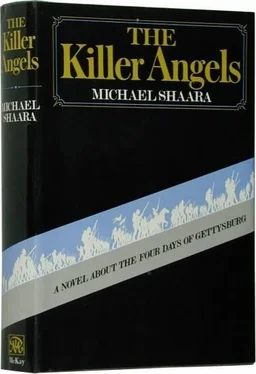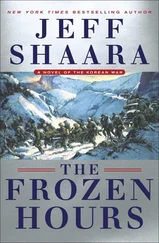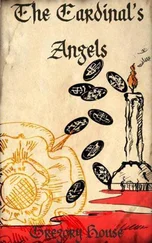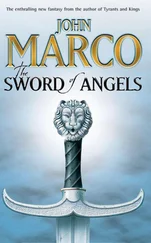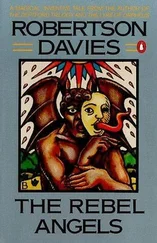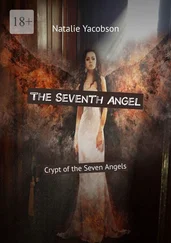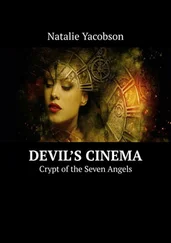”Where was you boys at Chancellorsville?”
”Well now.” A painful subject. Joshua Chamberlain opened his eyes.
”The fact is,” Tom said gloomily, “we was not engaged.”
”Well now, a lot of us wa’nt engaged. That there Hooker, I hear he froze right up like a pond in the dark.”
”Well, we had us a misfortune.” Tom turned eyes sad as a trout. He was a lean, happy, excitable man who had turned out to be calm and serene in combat. Soldiering was beginning to intrigue him.
”The thing was, damn, we had these here ‘noculations.
You ever been ‘noculated?”
The man swore earnestly Tom nodded. “Well, then, you a know Only thing was, we wound up sick, half the dang regiment. And come time for the fight at Chancellorsville our Surgeon Major-that’s a stumble-fingered man named Wormy Monroe-he up and reported us unfit for combat.
So they went ahead and sent us back to mind the dang telegraph wires. We wasn’t allowed to ‘sociate with nobody.
Old Lawrence there he went on up and argued, but wouldn’t nobody come near us. It was like he was carrying the plague. Lawrence said hang it, we ought to be the first ones in, we’d probably give the Rebs a disease and be more useful than any other outfit in the whole army. Matter of fact, way things turned, we probably would’ve been more use than most of them people. Anyway we wasn’t in it.”
The Maine man was chuckling. Chamberlain thought: would have thought mountain men were tougher than city boys. But mountain men get all the diseases. City boys get immune as they grow up. We were a thousand strong when we left Maine.
Gallant six hundred… Half a league, half a league…
It was quieter now. No one was talking. Sound of troops at route step, shuffle in the dust, dull clink of mess kits, a band in the distance, tinny, forlorn, raw call of a cow in the sunlight. A voice in his ear, a hand on his arm.
”Colonel, sir-“ exasperated-“beg the Colonel’s pardon, but would the Colonel do us all a favor and get back on the damned horse?”
Colonel opened his eyes into the glare, saw: Tozier. Color Sergeant Tozier. A huge man with a huge nose, sweat bubbling all over his face. “I’ll tell you, sir, be a damn site easier handlin’ these here new recruits if the officers would act like they got sense, sir.”
Chamberlain blinked, wiped at his sweat. Some of the men were watching with that odd soft look on their faces that still surprised Chamberlain. He started to say something, shook his head. Tozier was right. He mounted the horse.
Tozier said, “How are you, sir?”
Chamberlain nodded, grinned weakly.
”We don’t need no more new commanding officers,” Tozier said. “Here you. Lieutenant, keep an eye on the Colonel.”
Tom said, “Yes, sir.” Tozier departed. Chambenain thought: good thing old Ames didn’t see him. My boys.
Ames shaped them. But they’re mine. Year ago they held meetings to decide what to do; if they disagreed with an officer, they stopped and argued. Can’t conduct an army as a town meeting.
They were coming into Hanover. Out in a field dead bodies lay in untidy rows. The arms were up above the heads, the clothes were scattered, shoes were missing. The hair of some was flickering in the wind and they looked alive. Chamberlain learned: Stuart had been through here and there’d been a brush. The sight of dead men awakened them all.
A clear day, very hot. Wind swinging to the south.
Buzzards ahead. As they rode ladies waved handkerchiefs, a band played the “Star-Spangled Banner.” Chamberlain wondered: will the people here let the buzzards have them?
Or will they bury them, Stuart’s men?
The people of Hanover were delighted to see them. Now as they got closer to the Rebels people seemed much happier everywhere. Happiness seemed to increase in direct proportion to how close you were. When we actually get there. Chamberlain thought, it will be easy to tell: the men will be kissing you.
Chamberlain rode upright through town. On the far side he slumped again. For a short while Colonel Vincent came up to ride with him. Vincent was the new brigade commander-a very handsome man with thick sideburns, from the 83rd Pennsylvania. He had a good reputation and he had the air of a man who knew what he was doing. But Chamberlain had seen that air before. Hooker had it. And if ever there was a man who did not know what he was doing…
Vincent had heard about the 114 volunteers. He was impressed. He thought that things were looking up. The army was ready for a fight. That in itself was an impressive fact, after all that had happened. He showed Chamberlain the new brigade flag: triangular, white, with a blue border, a red Maltese Cross in the center. The man looked at it without interest. It meant nothing much, as yet. Vincent rode back. The man from the Second Maine said sadly, “You ever hear about our flag? It cost twelve hundred dollars.”
But the men were tired. There was silence again.
Chamberlain saw a rider going to the rear, a blue courier.
Then there was the first wagon, then another. There was fighting at Gettysburg. Off against the horizon he could see a haze, a dark haze, as of dirt stirred into the air.
Nothing to do now but rest on the march. The troops became very still. It was darker now. The land around them was hilly and green, turning slowly gold, then hazy purple.
It was a beautiful afternoon. At dark, word came forward to go into bivouac. Vincent came up and stopped the column, and the men moved gratefully out into a field, carrying the rails of the fences with them for evening fires. They had marched more than twenty miles again; it was now a hundred miles in five days. Now for the first time the new Maine men heard the call: Dan, Dan, Dan Butterfield! Butterfield!
And then down the road came more riders, rushing to the rear on lathered horses. Chamberlain looked up to watch them go, sensing alarm. He could feel the Gray army beyond the hills. A moment later there came the bugle call: Dan, Dan, Dan, Butterfield, Butterfield, then forward.
A universal groan. No rest now. The rattle of the rails being dropped, a general cursing. Chamberlain reformed the regiment out in the road. Dispatch from Vincent: Move out.
Word of what had happened moved slowly down the column, but it was a long while before word came down to Chamberlain. By that time it was well after dark and the moon was rising, yellow in hazy air, huge in the trees, gazing like one single vacant eye, and Vincent rode up.
Two Corps had been engaged at Gettysburg and had been driven off. The First Corps had done well, but the Eleventh, those Dutchmen, had run again, as they did at Chancellorsville. Now the First was holding and screaming back for reinforcements. John Reynolds was hurt, possibly killed.
Proceed with all possible speed.
Chamberlain did not protest. In the darkness he could feel his strength rising, coming over him in the cooler air of evening. Not far to Gettysburg now. He could hear no guns.
But now along the roadway there were people rushing out, people lining the rail fences, anxious, overjoyed. From houses back off away from the road there was a waving of flags, a fluttering of white handkerchiefs; women lifted lamps at the windows. There were many healthy-looking young men lining the road and some of the men from Maine grumbled. But the rest were too tired. Chamberlain saw some staggering, then one fell out. He collapsed in a clatter of falling rifle, of mess tins rattling in the dust. He was pulled aside. Chamberlain arranged a detail to pick up fallen men.
On and on. Now it was much darker and the moon was high, and then ahead there was an officer, a staff officer, sitting on a black horse. He rode out to meet Chamberlain as he passed.
Читать дальше
